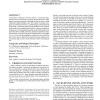SIGSOFT
2010
ACM
13 years 2 months ago
2010
ACM
Concurrent programs are notoriously difficult to debug. We see two main reasons for this: 1) concurrency bugs are often difficult to reproduce, 2) traces of buggy concurrent execu...
MICRO
2010
IEEE
13 years 2 months ago
2010
IEEE
Abstract--Parallel programming is hard, because it is impractical to test all possible thread interleavings. One promising approach to improve a multi-threaded program's relia...
ICSE
2010
IEEE-ACM
13 years 8 months ago
2010
IEEE-ACM
Concurrency is inherent in today’s software. Unexpected interactions between concurrently executing threads often cause subtle bugs in concurrent programs. Such bugs are hard to...
PPOPP
2005
ACM
13 years 10 months ago
2005
ACM
Dataraces in multithreaded programs often indicate severe bugs and can cause unexpected behaviors when different thread interleavings are executed. Because dataraces are a cause f...
ISCA
2009
IEEE
13 years 11 months ago
2009
IEEE
Shared-memory multi-threaded programming is inherently more difficult than single-threaded programming. The main source of complexity is that, the threads of an application can in...

